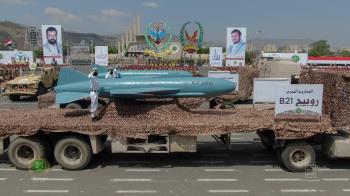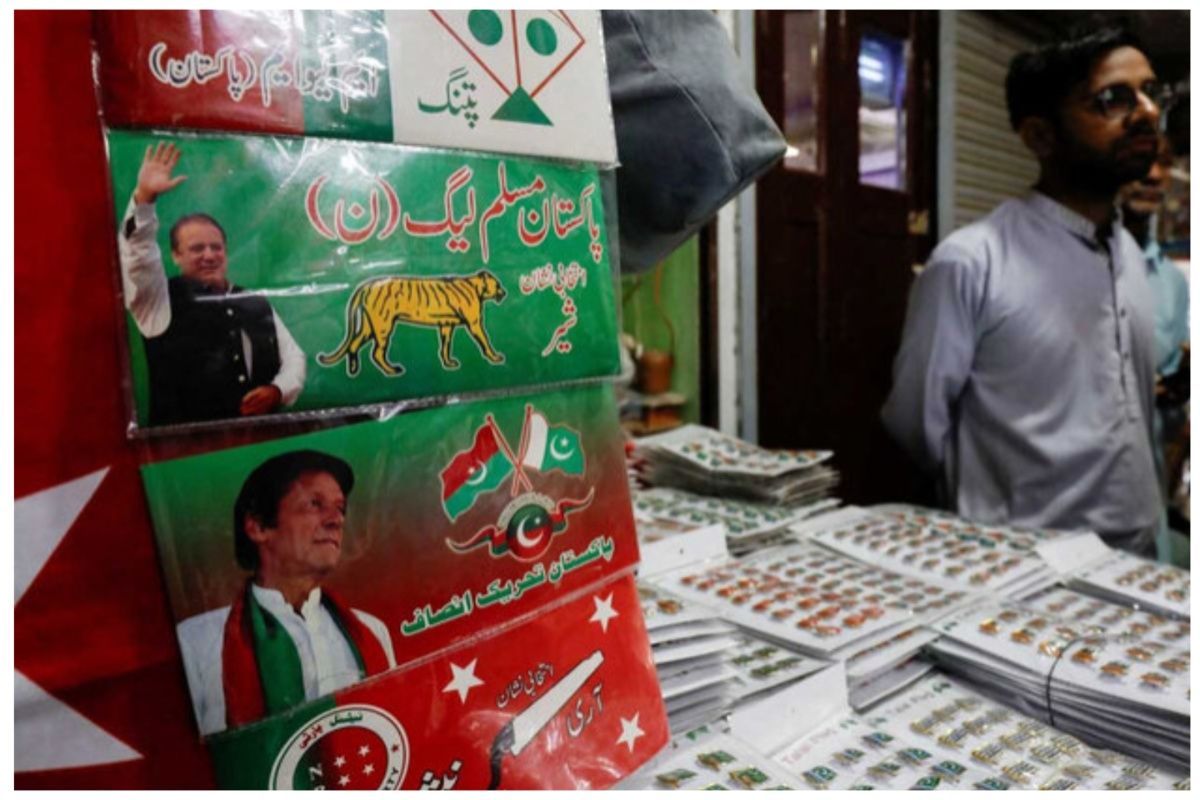Pakistan is facing a profound crisis due to a significantly delayed vote count and apprehensions regarding electoral manipulation. Imran Khan's supporters' triumph has cast a shadow of uncertainty over the political terrain, making it daunting to navigate through the challenges ahead.
ALWAGHT- Following months of eager anticipation for early elections in Pakistan, millions of voters exercised their rights by casting their ballots on Thursday in both parliamentary and regional elections.
Despite the heightened threat of militant attacks and the tragic loss of 26 lives in two explosions in Balochistan province, the election results fell short of satisfying the military and the ruling party, failing to secure a majority of seats.
Preliminary results released by the Pakistan Election Commission, as reported by Pakistani media outlets, suggest that independent candidates, largely backed by the Pakistan Tehreek-e-Insaf (PTI) party led by Imran Khan, the expelled Prime Minister, are leading the pack.
According to CNN, the Pakistan Election Committee announced that independent candidates have secured 98 seats thus far. Additionally, the BBC highlighted Imran Khan's claim of victory in the elections while he remains imprisoned, urging his supporters to celebrate this triumph.
In a video message on Friday night, Imran Khan vehemently criticized Nawaz Sharif, asserting, "The Justice Movement emerges as the primary victor of the Pakistani elections, overcoming two years of repression, injustice, and political conspiracies against us."
However, Nawaz Sharif, the former Prime Minister, also asserted that his party, the Muslim League (Pakistan), emerged as the most prominent winner of the elections and called upon other parties to form a coalition with them.
CNN reports that the Nawaz Sharif party has clinched the second position among the parties with the highest votes, securing 69 seats thus far, while the Pakistan People’s Party (PPP), under Bilawal Bhutto Zardari's leadership, has secured the third position with 51 seats.
Indications from reports suggest that the fate of the 22 undecided seats is insufficient to guarantee victory for either the Muslim League or the People's Party. None of the three major parties in Pakistan have managed to attain the necessary 169 seats for a parliamentary majority. Consequently, they are unable to independently form a government, leaving the next Prime Minister of Pakistan uncertain.
In terms of regional assemblies, the Pakistan Tehreek-e-Insaf party has obtained the majority in the Khyber Pakhtunkhwa provincial assembly. Additionally, the Muslim League is leading in the Punjab province, securing 88 seats compared to the League's 85 seats. In Sindh province, the People's Party has secured the majority, while seats in Balochistan province are distributed among various parties.
Within the framework of Pakistan's intricate electoral laws, independent parliamentarians cannot form a coalition government alone since some parliamentary seats are exclusively designated for parties. Independent representatives, many of whom were supported by Imran Khan's party, can align with any of the parties in Parliament following its formation. Imran Khan's party was not included in parliamentary elections, prompting his supporters to participate as independent candidates.
The triumph of Imran Khan's supporters comes as a highly unforeseen occurrence, given that pre-election analyses had indicated Nawaz Sharif, believed by some to have the backing of the Pakistani military, would emerge victorious. However, recent governmental and judicial efforts to impose a 10-year prison sentence on Imran Khan and Shah Mahmood Qureshi, Khan's foreign minister, suggested that other competitors were apprehensive about the potential success of the Pakistan Tehreek-e-Insaf party. Nonetheless, Khan, even while incarcerated, effectively mobilized his followers to the polling stations and clinched victory.
Voting occurred in 265 out of 266 electoral constituencies in the National Assembly of Pakistan, where a political party requires 133 seats for a simple majority. Overall, 169 seats out of 336 are needed for a simple majority. Voters directly elect 266 members, while 60 seats are reserved for women and 10 seats for non-Muslims based on each party's seat count.
In the event no political party secures an outright majority, the party with the highest number of seats can endeavor to form a coalition government.
The elections conducted on Thursday in Pakistan mark the twelfth of their kind, during which new members of the National Assembly and four provincial assemblies are directly elected by the general public. A party that attains a significant majority of seats in the National Assembly (two-thirds of the seats) assumes governance; otherwise, it will form a coalition government with sympathetic parties.
Accusations of electoral fraud and election nullification
Due to concerns over Khan and his allies' potential impact on the Muslim League party in parliament, there were reports of military maneuvers aimed at annulling elections at certain polling stations to sway the results in favor of Nawaz Sharif. Moreover, the abrupt disruption of internet services in specific areas heightened suspicions of vote manipulation and potential fraud.
According to Pakistani journalist Hamid Mir, speaking to Geo News, "All results have been prepared since Friday morning and are laid out on the Election Commission chairman's desk, but government bodies have yet to disclose them, leading to possible disagreements." Mir emphasized the Election Commission and Pakistani decision-makers' confusion over the election outcomes, stating, "Any results released after 10 a.m. are questionable, and the Election Commission's actions could have serious repercussions." He highlighted the significant role of youth in favoring Imran Khan, leaving the committee unsure of how to address the situation, hence delaying the results.
Conversely, violent protests erupted across Pakistan on Friday amid suspicions of electoral fraud and irregularities in vote counting. Even the Pakistan Human Rights Commission cautioned against the lack of transparency in the election process, deeming the results deeply concerning. A senior assistant of Imran Khan mentioned that party leaders would convene to review the election outcome and would maintain communication with Khan himself.
The uncertain political and economic outlook of Pakistan
In light of the political tensions over the past couple of years involving Imran Khan, the military, and the government, the security and political landscape of the country remain volatile and may exacerbate tensions further.
Nawaz Sharif, aiming for his fourth term as Prime Minister, expressed optimism regarding his anticipated victory and had previously dismissed the idea of forming coalitions with other parties. Past experiences have demonstrated the ineffectiveness of coalition governments in Pakistan, raising the possibility that the election outcomes could be invalidated by the government and the military. The military and the ruling party have exerted considerable efforts in the past year to marginalize Imran Khan's party and permanently eliminate its influence. However, they now find themselves confronted with a diverse range of his affiliated representatives who will shape the government's trajectory.
Certain observers speculate that Imran Khan's allies might seek recourse in the courts to challenge Khan's incarceration sentences or contest the electoral commission's prohibition on holding governmental positions, potentially heightening tensions with the military and the established government.
Despite the allure of aligning with more established mainstream parties, candidates supported by the Pakistan Tehreek-e-Insaf party have consistently affirmed their reluctance to join such factions. With a majority in these groups, the prospective government will encounter strong opposition in parliament.
Analysts contend that against the backdrop of Pakistan's tumultuous political environment, compounded by economic crises characterized by soaring inflation, energy shortages, and sectarian violence, the formation of a coalition appears unlikely.
According to Reuters, Moody's Investors Service emphasized the significance of promptly announcing election results, which contributes to the establishment of a stable new government and diminishes policy and political uncertainties. This is particularly crucial for a country facing daunting economic challenges.
Foreign Policy's analysis suggests that the recent election outcome is unlikely to foster stability. Instead, the forthcoming government is anticipated to be a weak and fragmented coalition. Those on the losing end are expected to vehemently reject the election results, fueling public discontent, particularly among Tehreek-e-Insaf supporters. Although Khan's party is actively mobilizing its base through voter outreach initiatives and participating in elections alongside independent candidates in parliament, these endeavors appear ineffective.
Conversely, the incoming administration of Pakistan will confront an economic landscape marred by unprecedented inflation and sluggish growth, stemming from rigorous reforms. Last year, the country narrowly averted a deepening crisis as then-Prime Minister Shehbaz Sharif secured a $3 billion financial aid package from the International Monetary Fund. However, this assistance is slated to expire in March, and amid persistent political turmoil, international financial institutions may withhold further support.
Pakistani economist Abid Qayyum Suleri, interviewed by The Washington Post, highlighted Pakistan's reliance on international financial resources to sustain its economy and its inability to boost government expenditure. The next government may consider expanding food and gas subsidies to preserve social stability, potentially complicating future negotiations with international aid organizations regarding debt reduction.
Despite enjoying widespread public support in Pakistan, Imran Khan is detained on security and legal charges. However, there are concerns that his continued incarceration could exacerbate tensions precisely at a time when stability is crucial for attracting foreign investment and bolstering economic resilience.
The Military's Stance in the Recent Elections
Given the predominant power of the military in Pakistan and the consequential dynamics shaped by interactions between governments and military commanders, the recent elections underscored the evident role of this security force. On polling day, the army exercised control over all urban streets to preempt any potential disorder and insecurity.
According to a statement by the Pakistan Army, more than 150,000 troops were deployed to safeguard polling centers, contributing to the successful and generally peaceful conduct of the elections.
While the military refutes claims of interference in political matters, indications suggest its involvement in supporting Nawaz Sharif during this election cycle, evident in the rush to polling stations aimed at nullifying the elections.
Political analysts advocate for a calibrated approach to address Pakistan's security and economic challenges, emphasizing the need to confine the military within its constitutional boundaries, limit unwarranted political interventions, and address instances where institutional interests override national ones. Such measures are crucial for fostering a political environment that prioritizes stability and democratic principles.
According to Reuters, "The incoming government must navigate a delicate balance between appeasing influential generals and upholding its own policies. Historically, elected administrations have been displaced through military coups or indirect pressures from military leaders." It is noteworthy that no prime minister in Pakistan's 76-year history has completed a full five-year term, with elections frequently held prematurely amidst military interventions and external influences.
According to Foreign Policy News Agency, it's improbable that the military, keen on assuming a leading role in Pakistan's economic advancement, will withdraw to its barracks post-elections. Such a move could potentially trigger a fresh crisis, particularly if Nawaz Sharif regains power, given his tense relationship with the military during his previous tenure.
Given Khan's consistent portrayal of the army as the force behind his ousting, the return of his supporters to parliament is likely to heighten tensions with the military. Consequently, some analysts argue that amidst the ongoing exchanges between the Muslim League party and the army, the military may prefer Nawaz Sharif's return to power. Sharif's experience gives the military confidence in stabilizing the economy, and he presents a formidable challenge to Khan.
Amidst an ill economy and numerous challenges confronting Pakistanis, achieving political stability is crucial for a country drowning in debt. The political environment in Pakistan is such that any new political turmoil could divert policymakers' focus from addressing critical social, economic, and security issues. For many Pakistanis, these elections might represent the climax of a movie they'd rather not witness.



























